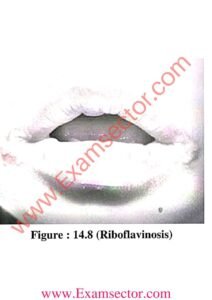Vitamin B2 (Riboflavin) : Role, Sources and Deficiency
Vitamin B2 (Riboflavin)
- A pentose sugar called ‘ribose’ and an iso centre is present in riboflavin. It is readily soluble in water and gets damaged by light and ultraviolet rays of the sun.
Functions of riboflavin—
- Regulation and controlling of hormones— riboflavin plays an important role in the formation of enzymes that are responsible for the metabolism of carbohydrate, fat and proteins. Riboflavin is important for activity of insulin hormone.
- Maintaining health of skin— riboflavin helps in keeping skin beautiful, attractive, hydrated and glowing.
- Maintaining health of eyes— riboflavin is essential for the health of eyes. In the absence of riboflavin, blood cells in eyes get damaged.
- Helpful in physical growth— riboflavin provids nutrition to body cells. It is essential for releasing power in body cells.
Effects of deficiency of riboflavin—

- Skin injuries— deficiency of riboflavin affects face, skin, eyes and vascular system. Skin becomes red and injured. Inflammation of the corners (angles) of the lips which sometimes bleed is known as angular stomatitis. Cheilosis is a painful inflammation and cracking of the corners of the mouth. Ulcers on the tongue is a common effect of deficiency. The color of tongue changes from natural to somewhat dark and it is known as glossitis.
- Effect on eyes— deficiency of riboflavin affects eyes. Light resistance power of eyes reduces and a sticky substance is secreted from eyes permanently which if not treated may lead to loss of eyesight.
- Physical growth is disrupted and there is loss of appetite. Digestive capacity reduces.
- Riboflavin deficiency causes soreness of testicles in men.
Sources of riboflavin—
- riboflavin is found mainly in liver, dry yeast, eggs, meat, fish, whole grains, lentils and green leafy vegetables.
Home Science Latest Post :- Click Here
Vitamins Questions and Answers :-
Que1. Which of the given was invented by Kazimierz Funk?
(a) Enzymes
(b) Hormones
(c) Vitamins
(d) Proteins
Click to show/hide
Ans. ⇒ { c }
Que2. What type of compounds are Vitamins?
(a) Organic Compound
(b) Inorganic Compound
(c) Living Organisms
(d) None of the above
Click to show/hide
Ans. ⇒ { a }
Que3. Which is also known as the “Accessory dietary factor”?
(a) Fats
(b) Vitamins
(c) Proteins
(d) Hormones
Click to show/hide
Ans. ⇒ { b }
Que4. Which is not an essential element for plant growth?
(a) Potassium
(b) Calcium
(c) Magnesium
(d) Sodium
Click to show/hide
Ans. ⇒ { d }
Que5. Which of the given has the highest calorie value per unit?
(a) Vitamins
(b) Proteins
(c) Fats
(d) Carbohydrates
Ans. ⇒ ????
